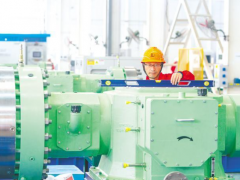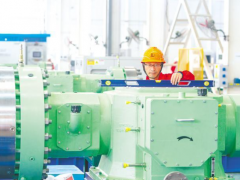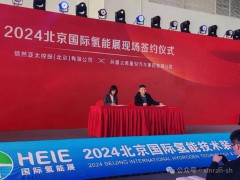據(jù)海上風(fēng)能網(wǎng)6月27日?qǐng)?bào)道,Lhyfe正在法國測試名為Sealhyfe海上制氫平臺(tái)在上個(gè)月被拖到與BW Ideol的浮動(dòng)風(fēng)力渦輪機(jī)Floatgen相連的SEMV-REV海上試驗(yàn)場后,于6月20日開始生產(chǎn)首批氫氣。
Sealhyfe預(yù)計(jì)每天能夠生產(chǎn)多達(dá)400公斤的氫氣。
從2022年9月開始,在圣納澤爾港的一個(gè)碼頭進(jìn)行了八個(gè)月的測試后,隨著投產(chǎn)里程碑的到來,該平臺(tái)已進(jìn)入第二階段的測試,重點(diǎn)是在海上條件下生產(chǎn)氫氣。
Sealhyfe包括一個(gè)由Plug提供的1兆瓦電解槽,安裝在GEPS Techno的WAVEGEM浮動(dòng)平臺(tái)上,該平臺(tái)經(jīng)過重新設(shè)計(jì),可穩(wěn)定海上生產(chǎn)裝置。
在港口進(jìn)行的八個(gè)月測試中,該平臺(tái)進(jìn)行了基準(zhǔn)測試以及技術(shù)和系統(tǒng)優(yōu)化。通過第一階段的試驗(yàn),Lhyfe還開發(fā)了使Sealhyfe能夠完全自主運(yùn)行所需遠(yuǎn)程管理網(wǎng)站軟件和算法構(gòu)建模塊。
該公司表示,在第一個(gè)測試階段之后,其已經(jīng)更新了所有陸上和海上站點(diǎn)的操作規(guī)范,并且所有設(shè)備都將受益于Sealhyfe試點(diǎn)項(xiàng)目的操作優(yōu)化。
在Centrale Nantes的SEM-REV海上試驗(yàn)場,由OPEN-C基金會(huì)運(yùn)營、位于大西洋距離法國海岸20公里的Sealhyfe通過專門為氫氣應(yīng)用設(shè)計(jì)的臍帶電纜連接到該試驗(yàn)場的海底樞紐。
據(jù)Lhyfe稱,在該平臺(tái)被拖至連接到集線器后,該系統(tǒng)在短短48小時(shí)內(nèi)重新啟動(dòng)并投入使用。
該公司現(xiàn)在將重現(xiàn)在碼頭進(jìn)行多次測試,以便對(duì)結(jié)果進(jìn)行比較,然后將進(jìn)行額外的海上特定測試。
為了在海上環(huán)境中實(shí)現(xiàn)可靠的氫氣生產(chǎn),Lhyfe計(jì)劃開發(fā)一種操作能力,包括管理平臺(tái)的運(yùn)作和環(huán)境壓力以及驗(yàn)證綠色和可再生氫氣生產(chǎn)軟件和算法。
郝芬 譯自 海上風(fēng)能網(wǎng)
原文如下:
World’s First Offshore Hydrogen Production Project Yields First Kilograms of Green Hydrogen
The offshore hydrogen production platform that Lhyfe is testing in France, named Sealhyfe, began producing its first kilograms of hydrogen on 20 June after it was towed last month to the SEM-REV offshore test site which is connected to BW Ideol’s floating wind turbine Floatgen.
Sealhyfe is capable of producing up to 400 kilograms of hydrogen per day.
With the start-of-production milestone now reached, the platform has entered the second phase of testing, which focuses on producing hydrogen in offshore conditions, after eight months of being tested at a quay in the Port of Saint-Nazaire, starting in September 2022.
Sealhyfe comprises a 1 MW electrolyser, supplied by Plug, mounted on GEPS Techno’s WAVEGEM floating platform which has been re-engineered to stabilise the production unit at sea.
During the eight months of testing at the port, the platform underwent benchmarking tests and technology and system optimisation. Through this first phase of trials, Lhyfe also developed software and algorithm building blocks necessary to manage the site remotely and to enable Sealhyfe to operate fully autonomously.
The company says that, following the first testing phase, it has already updated its specifications for all its sites, both onshore and offshore, and that all of its units will benefit from the operating optimisations trialled in the Sealhyfe pilot project.
At Centrale Nantes’s SEM-REV offshore testing site, operated by the OPEN-C Foundation and located 20 kilometres off the French coast, in the Atlantic Ocean, Sealhyfe is connected to the site’s subsea hub via an umbilical cable that was specially designed for hydrogen application.
After the platform was towed and connected to the hub, the system was restarted and on stream in just 48 hours, according to Lhyfe.
The company will now reproduce all of the tests that were performed at quay several times in order to have a comparison of results and will then be carrying out additional offshore-specific tests.
With an aim of achieving reliable production of hydrogen in the offshore environment, Lhyfe plans to develop an operating capability that involves managing the platform’s movement and environmental stresses, and validating green and renewable hydrogen production software and algorithms.
免責(zé)聲明:本網(wǎng)轉(zhuǎn)載自其它媒體的文章及圖片,目的在于弘揚(yáng)石化精神,傳遞更多石化信息,宣傳國家石化產(chǎn)業(yè)政策,展示國家石化產(chǎn)業(yè)形象,參與國際石化產(chǎn)業(yè)輿論競爭,提高國際石化產(chǎn)業(yè)話語權(quán),并不代表本網(wǎng)贊同其觀點(diǎn)和對(duì)其真實(shí)性負(fù)責(zé),在此我們謹(jǐn)向原作者和原媒體致以崇高敬意。如果您認(rèn)為本站文章及圖片侵犯了您的版權(quán),請(qǐng)與我們聯(lián)系,我們將第一時(shí)間刪除。







